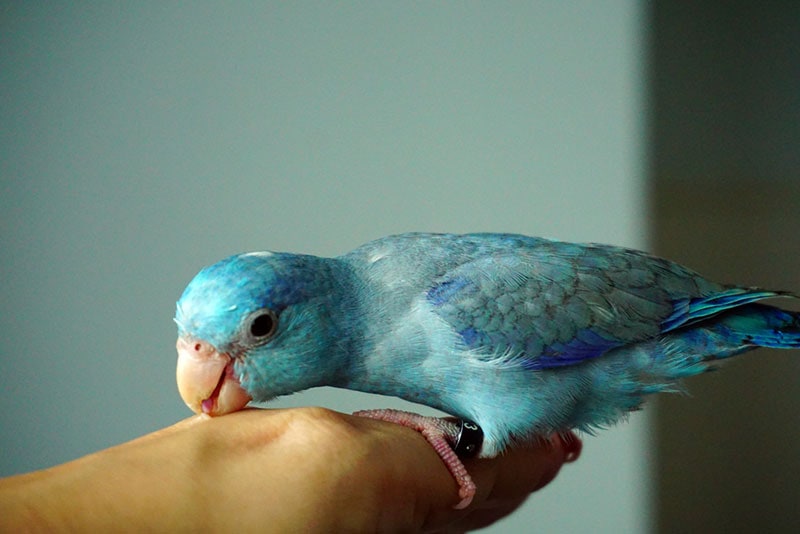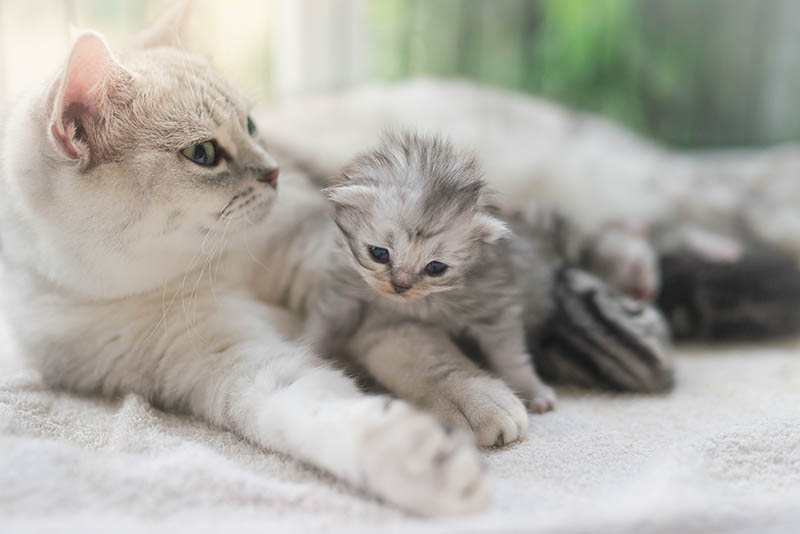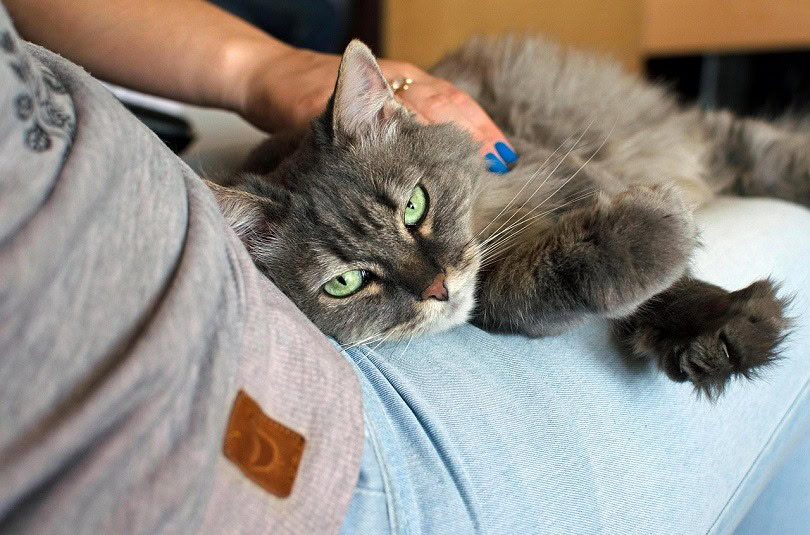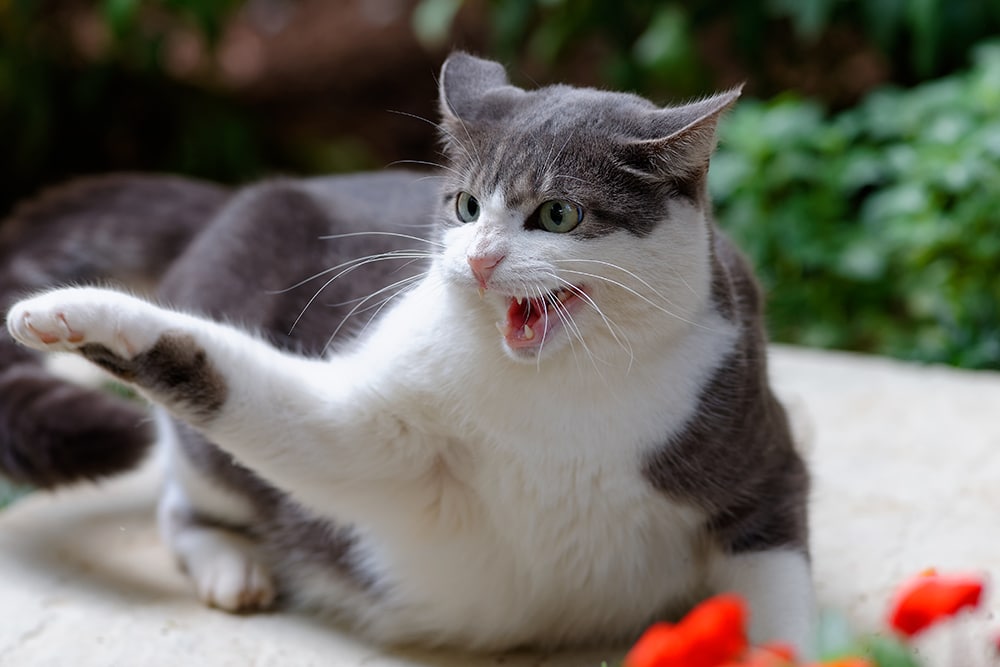VET APPROVED

The information is current and up-to-date in accordance with the latest veterinarian research.
Learn more »Click to Skip Ahead
Parrots make awesome pets, but they can develop problem behaviors that make keeping them difficult. Biting is one of the worst behaviors that a parrot can partake in, especially for you, their owner, as one of those bites can be quite painful. Parrots, especially large ones like Macaws, have powerful beaks that could cause severe injuries in a split second. If your bird is being extra “bitey,” you need to determine why so you know how to stop it.
Read on to learn the six reasons that parrots bite and four tips on how to stop this bad behavior before someone gets seriously hurt.

The 7 Reasons Why Parrots Bite
1. Fear
Parrots will bite as a fear response. These are prey animals and can be easily startled by new situations, people, or things. They may not be afraid of you necessarily, but if they’re in a new environment or with strangers they don’t know, the biting could definitely be the result of this unfamiliar situation.
As prey animals, their fears may not always make sense to us either. So, if your parrot is biting you out of fear, you need to take a good look at their environment to see why.
For example, I have a conure that is petrified of the blue mop I use in her room sometimes. The red mop is fine, but she cannot handle the blue mop.
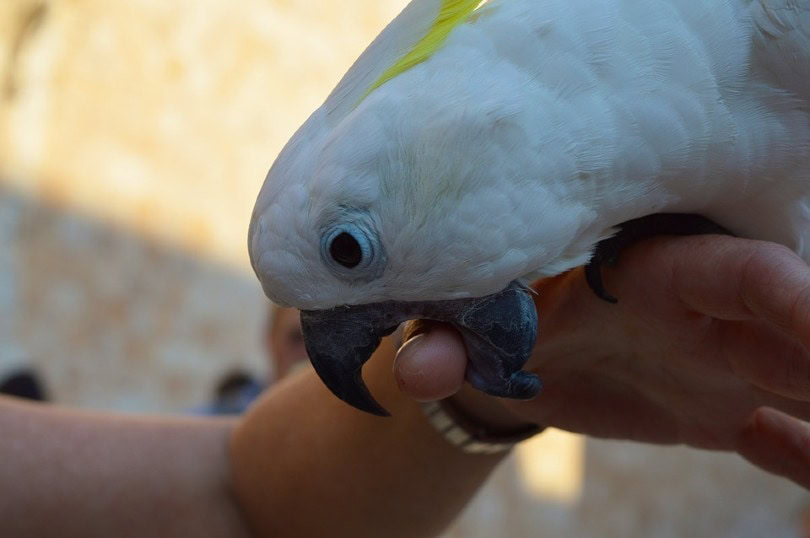
2. Possessiveness
Parrots can become possessive of their favorite family members, their cage, and even their toys, so they may bite when they believe their favorite possessions or people are at risk.
To understand your bird’s possessiveness, it’s important to know a bit more about wild parrots. In the wild, many birds form monogamous pairs, often fiercely protecting their relationship and biting anyone or anything that gets in their way. While we humans often view possessiveness as a red flag in relationships and a negative trait to see in our pets, birds in the wild rely on it to keep their species alive. In addition, parrots are flock animals and will try to stick with their flock even when they aren’t mating.
3. Hormones
If you’ve had your bird for any length of time, you know what a burden hormones can be to deal with. When it’s breeding season, even the sweetest and most gentle bird can transform into a biting maniac. It’s no fault of their own, though; those hormones can wreak absolute havoc on your poor feathered friend.
Other hormonal behaviors include:
- Feather plucking (particularly the feathers on the chest and between the legs)
- “Throwing up” on you (more precisely, regurgitation for allofeeding)
- Crouching down and panting
- Hiding in dark places (e.g., under furniture)
- Shredding paper
- Lunging at people
- Screaming
You do not want to encourage hormonal behavior, so it’s best to follow these rules:
- Only pet your parrot on their head.
- Gradually increase their hours of sleep from 10 to 12 hours nightly to 14 to 16 hours.
- Remove anything from their environment that may be mistaken as a nest or nesting materials (e.g., cardboard boxes, sleeping huts, etc.).
- Seek veterinary care, as many behavior issues attributed to hormones may have a medical component to them as well.
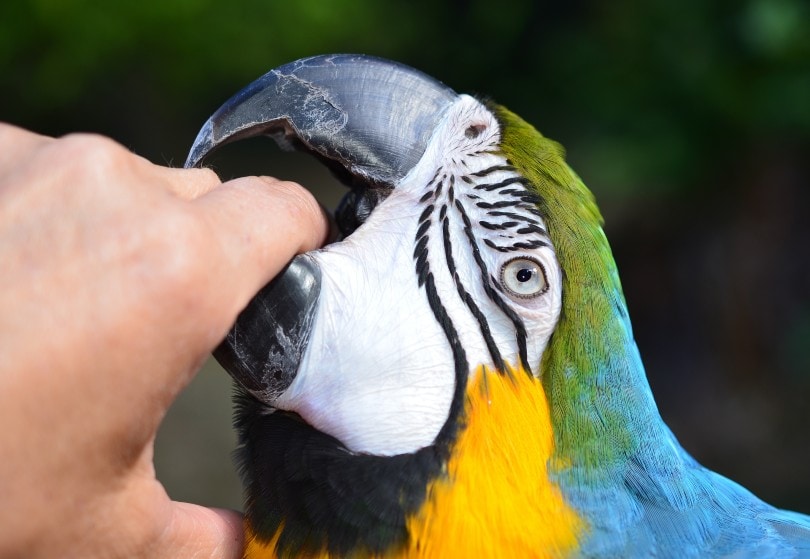
4. Illness
Parrots are generally good at hiding illnesses, a skill they learn in the wild to preserve their species, as a sick or injured bird is easy prey. However, your parrot may exhibit signs that they’re unwell, including biting more than usual. Other signs of illness include:
- Sitting at the bottom of the cage
- Fluffed-up feathers
- Shaking
- Eyes close
- Changes in droppings
- Reduced appetite
- Difficulty breathing
- “Tail bobbing” with every breath
- Discharges from any orifice (mouth, eyes, nares, cloaca)
- Feather loss
- Feather pulling
- Refusal to fly or sudden inability to fly
5. Beaking
Sometimes when parrots use their mouths on your hands, they’re exhibiting exploration biting, also known as “beaking.” This is especially common in younger birds, as they’re growing and learning more about their world, though it’s not unusual to see this behavior in older parrots too. As hookbills, parrots use their beaks as a third hand to explore their climbing structures, including your fingers as they step up. This isn’t actually biting but is often mistaken as such.
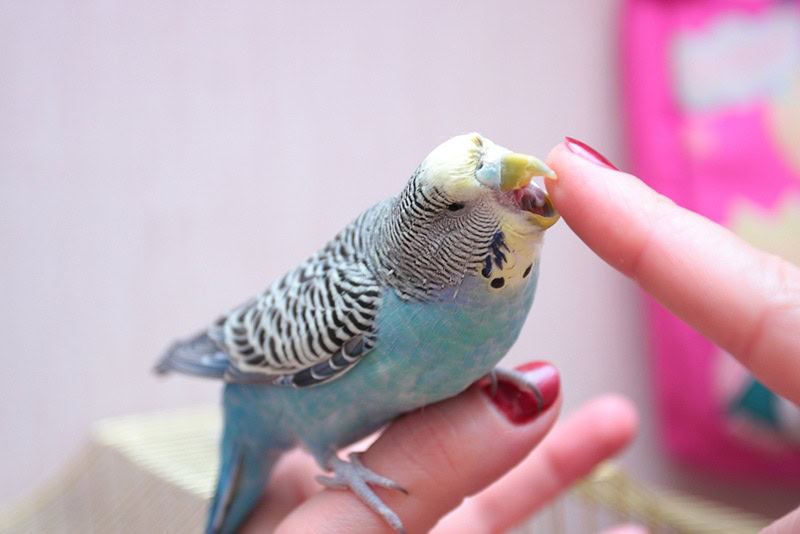
6. Warning
Parrots often bite as a last line of communication. They do it to each other in the wild and will naturally do it even if they’ve been hand-raised. When birds choose to bite, it is almost always the owner’s fault, as they’ve been trying to tell them something, and they missed all their signals. The bite means they’re telling them to back off.
7. Inappropriate Training
If a parrot has been trained inappropriately, they may think they’re your boss and sometimes may bite if you do something they don’t approve of, almost as a way of reprimanding you. This issue is complex and usually requires professional intervention to fix. Unfortunately, if a parrot that bites you notices that it worked once, they may inadvertently train themselves to repeat the habit.

How to Avoid Getting Bitten
Learn Parrot Body Language
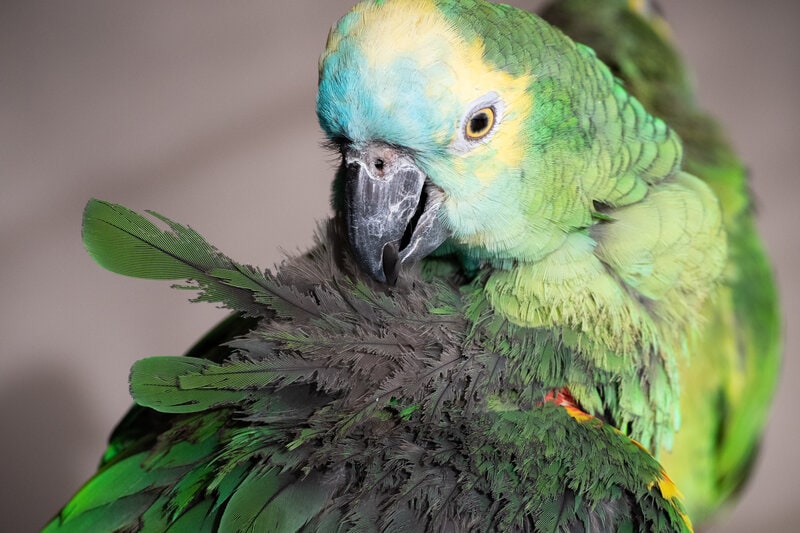
Learning how to read your parrot’s body language will go a long way in ensuring you don’t get bitten. Most birds will give their owners a clear warning before resorting to biting. Look for signs like:
- Flashing eyes
- Constricting pupils (also known as “eye pinning”)
- Flattened feathers
- Standing tall
- Fluffed feathers
- Body parallel to the ground with the head down
- Slight swaying
- Beak open
- Hissing (or producing a strange sound akin to hissing)
- Clucking
Never Force Your Bird to Do Things
Please don’t force your parrot into doing something (e.g., stepping up or down, eating, etc.) that they clearly do not want to do. Knowing how to read your bird’s body language is a useful skill, as you’ll then learn how to determine what your pet does and doesn’t want to do.
Socialize Them
Early socialization is key to a well-rounded adult parrot. Being socialized isn’t necessarily something that comes naturally to all parrot species. As a prey animal, it’s natural for them to be wary of new people and new situations, so they’re likely to be nervous or stressed out around people at first. Socialization is an essential part of parrot ownership, especially if you know that your bird will be around more people than just yourself and those whom you share your home with.
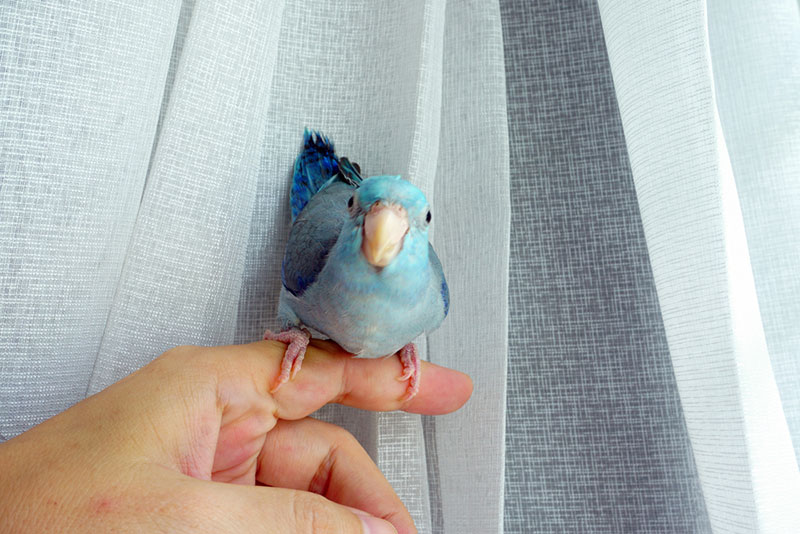
Train Them
Training your parrot to respond to commands like “step up,” “step down,” and “no” is a great way to avoid getting bitten. You may want to incorporate stick training into your regimen, which is where you use a stick to train your parrot to step up and step down. Make sure you have plenty of high-value rewards (like tasty treats) for training sessions so your bird will begin to positively associate certain behaviors with them. However, forcing your parrot to train when they don’t want to is a surefire way to get bitten.
Out-training biting behaviors can be challenging and time-consuming. It is worth your while, however, as we all know how badly parrot bites hurt.

What to Do When You Have Been Bitten
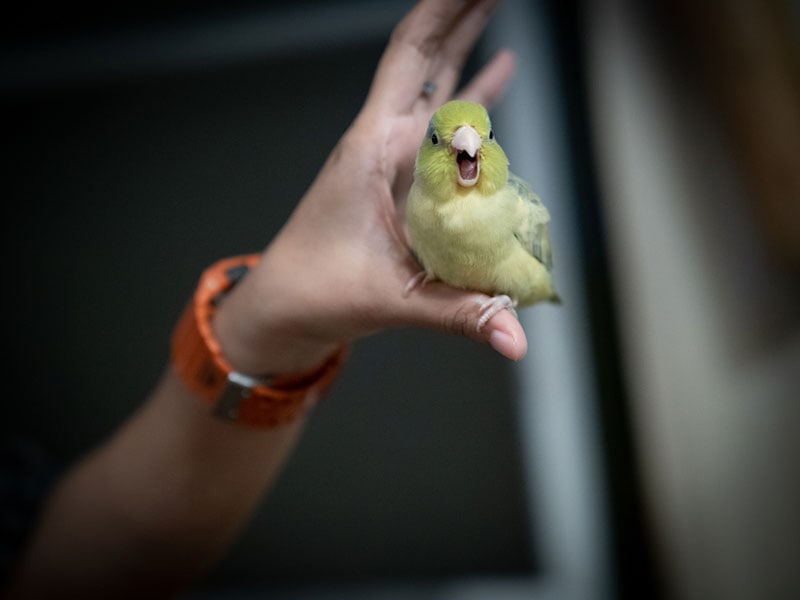
Your reaction to your parrot’s bites is an important part of breaking this habit. When your parrot bites you:
- Do analyze the situation from their POV. Did you do something to cause them to react that way? Is there something new or unusual in their environment? If you find a trigger for the biting behavior, remove it so it will not provoke future biting behavior.
- Do appreciate the fact that in your parrot’s mind, they’ve done nothing wrong in the events leading up to the bite. They have acted to the stimuli, environment, and conditions around them.
- Do not react with a lot of yelling or drama. This can cause more fear in your parrot and even increase the potential for future bites.
- Do say “no” firmly to let them know that biting is unacceptable.
- Do not pull your finger away too quickly or too hard.
- Do put them in a time-out in their cage.
- Do not punish your parrot by yelling or hitting them. They may be intelligent creatures, but they won’t necessarily understand the link between their behavior and your harsh punishment. This will only destroy the trust the two of you have built. A parrot is also extremely fragile, and striking them may lead to an injured pet.

Final Thoughts
Parrots may bite for many reasons, so your job is to determine what triggered your bird into biting you. Once you can identify the trigger(s), you can make changes to your behavior or your parrot’s environment to prevent bites from happening in the future. Although biting is unacceptable behavior, ensure that you’re reacting properly so as not to instill further fear into your bird, potentially precipitating more bites.
- See Also: Hawk-Headed (Red Fan) Parrot
Featured Image Credit: Ploychan Lompong, Shutterstock
